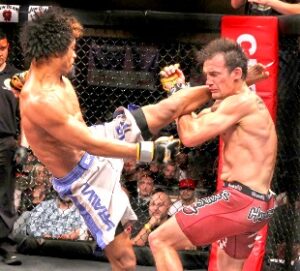
Are you wondering: What does Dana White do as UFC president? Or what’s Dana White’s role and what tasks does he do for the promotion?
In this article, we’ll examine the 7 tasks Dana White does as UFC president and whether there’ll ever be a Dana White replacement.
Contents
What Does Dana White Do as UFC President?
On April 29, 2021, Endeavor had an initial public offering which they used to raise $1.75 billion to buy the remaining 34.1% of UFC shares.
This meant Dana White no longer owned a percentage of the UFC, but he stayed on as UFC president for a very healthy wage and kept the same duties.
Here’s what Dana White does for the UFC as president:
- Matchmaking
- Business development and expansion
- Contract and fight negotiations
- Post-Event bonuses
- Press conferences
- Decision-making and face of the UFC
- Long-term thinking
Here’s a closer look at the roles and tasks Dana White fulfills for the UFC.
1. Matchmaking
One of Dana White’s most important UFC tasks is and always has been matchmaking. Selecting two fighters to put on a great show is the most crucial aspect of a successful MMA promotion. If the fights aren’t great, what else have you got?
Dana White has two things to consider when matchmaking:
- Matching evenly skilled and ranked opponents
- Creating fights fans want to see
Great matchmaking is an art. Dana White understands the overall brand of the UFC is showcasing the best mixed martial arts around the globe, but he also understands the fans are the business, and pleasing them is what leads to the biggest PPV numbers and overall revenue.
This sometimes means promoting and giving more opportunities to a trash-talker who can hype a fight, ahead of more deserving and/or talented fighters, and being able to control disapproval.
It also involves a deep understanding of the fighters, their styles, their strengths, and weaknesses, how they match up against each other, as well as knowing what the fans are thinking and want.
Striking a balance between the two is important in keeping the UFC machine ticking, and Dana White knows the process inside out.
Another thing Dana does well is dropping little hints for potential matchups he knows would be a great match and wants to be signed.
Overall, Dana White has a vision for the organization and uses matchmaking as a tool to realize that vision.
2. Business Development and Expansion
Dana White also heads business development and expansion for the UFC and has done so since he arrived in 2001.
Some of the biggest deals Dana White has negotiated or been heavily involved in are:
- Getting Spike TV to broadcast The Ultimate Fighter in 2005 (TUF was also Dana White’s idea)
- Focused on the Pay-Per-View business model
- Acquisitions of former MMA promotions such as PRIDE and Strikeforce
- UFC apparel deals with Reebok and Venum (2015 and 2021)
- UFC broadcast deals with Fox Sports, BT Sport, ESPN (2011, 2013, 2019)
- UFC Sponsorship deals
- First MMA promotion to cover its fighters with insurance for training-related injuries (2012)
- Negotiated UFC International Fight Week with the Las Vegas Visitors Authority (2012)
- Huge MMA/UFC content library via the UFC Fight Pass (2013)
- UFC-USADA partnership (2015)
- Dana White’s Contender Series (2017)
- Building the UFC Performance Institute (2017)
- Getting UFC as the first major sport up and running during COVID (2020) through his negotiations with Abu Dhabi
As can be seen, what Dana White does and has done for the UFC in terms of business development and expansion is very impressive.
He’s spearheaded the UFC into a global MMA product with events all around the world, so it must be said his leadership, negotiation, people skills, and decision-making skills are exceptional.
3. Contract & Fight Negotiations
While matchmaking is one half of the job, the other half is the countless hours of negotiating contracts for proposed fights.
Dana White enters the UFC contract negotiations and he spends a lot of time making phone calls to fighters, agents, and everyone involved in the negotiation process.
He’s heavily involved with:
- How much the fighters earn per fight
- The length of the contract or number of fights
- PPV point percentages
And while a large part of the negotiation process is financial, the other part is being a negotiator who has influence, creates a connection, and generally tries to make the process go as smoothly as possible.
He knows how to keep the overwhelming majority of UFC fighters happy with their contracts, all the while most people would tell you they’re being underpaid.
At the same time as getting fighters to sign contracts, he has a great eye for making sure the UFC is increasing revenue and profits every single year.
He was even willing to part ways with UFC heavyweight champion Francis Ngannou because he believed Francis was asking for more money than he was worth.
4. Post-Event Bonuses
As UFC president, Dana White has the job of deciding which fighters deserve the bonuses post-event.
While this isn’t a hard job, he has to stay focused and watch every fight at every single event, and he also takes responsibility for potentially upsetting fighters.
The two main bonuses are the:
1. Performance of the Night
$50,000 each is paid to two fighters who put on the best performance of the night (can be separate fights). It’s usually paid to fighters with the best knockout, submission, comeback, or most entertaining fight on the card.
Dana White can award as many Performance of the Night bonuses as he wants and gave 10 at UFC 282. However, it’s usually 2 to 4 fighters who earn a POFN bonus.
2. Fight of the Night
There’s only ever 1 FOTN with both fighters taking home $50,000.
A less commonly mentioned UFC bonus is the:
3. Discretionary Bonuses
Discretionary bonuses, or locker room bonuses, are extra payments paid to UFC fighters who didn’t quite make the cut for an official UFC bonus.
They’re paid at Dana White’s discretion and are between $4,000 to $25,000, where the average was $5,000 in 2020.
As these bonuses are paid at Dana’s discretion, it gives him great influence over the fighters – which can even be considered another thing Dana White does for the UFC.
5. Press Conferences
Dana White also has the responsibility of leading UFC PPV pre and post-fight press conferences.
In the pre-fight press conferences, Dana White introduces the card and fighters and leads the dance by choosing which media representative to ask the next question.
He stays present to answer any questions the media has for him and generally keeps the conference ticking.
In the post-fight press conferences, Dana White has his own time slot of 30 to 45 minutes where he answers dozens of questions from the MMA media. They ask him questions about the event and everything UFC/MMA related.
He also attends UFC ceremonial weigh-ins every Friday to greet the fighters and be there for the face-offs. Fighters are less likely to get aggressive if the boss is in the firing line.
6. Decision-Making and Face of the UFC
While not a direct task, another thing Dana White does for the UFC is act as the face of the promotion. The UFC needs a face, and it can’t be fighters because they come and go.
As the face of the UFC, Dana White takes plaudits but he mostly takes a lot of criticism. Much of the negative things said about him might discourage a less mentally strong person, and many people can’t do what he does because of this.
So, while Dana White faces the media, takes criticism head-on, and simply shrugs it off (at least from what outsiders can see), he allows the rest of the UFC to focus on their jobs and not have to worry about negative press or distractions.
Dana White also makes all of the final decisions for the UFC, which is a lot of weight and pressure to carry.
On top of the things already mentioned above, he also decides which fighters to sign, which fighters to release, and how to discipline fighters who go against the UFC fighter’s conduct.
He has decades of experience as president and promoter and the final decisions are very important to the success of a promotion – especially businesses worth billions.
7. Long-Term Thinking
Dana White is laser-focused and has always thought about the long-term progress of the UFC and MMA as a sport.
This may have changed slightly with the sale of his last UFC shares in 2021, but since he became the UFC president in January 2001, Dana White has lived and breathed the UFC and given his time, energy, and full attention to making sure the UFC was successful.
Who Will Be Dana White’s Replacement?
Endeavor and the UFC won’t allow anyone to know who Dana White’s replacement could be until a decision has been made. As it stands, Dana White has no exit date and is looking to stay on for many more years.
Former Endeavor employees have revealed the company executives believe Dana White to be the only man who can run the UFC.
Looking at his successful track record with the UFC over the last 22 years, all the things Dana White still does for the UFC, and how he faced zero consequences for the New Year’s Eve incident with his wife, shows how powerful he is and how essential he is to the UFC.
The only person that’s been talked up and can be considered a serious candidate to be Dana White’s replacement is Hunter Campbell.
Hunter Campbell is the UFC’s Chief Business Officer and has been with the promotion since 2017. Over these 6 years, he’s had plenty of time to learn the ins and outs of the business and see how Dana White does things.
However, only time will tell if Dana White will be replaced. Despite losing his remaining shares in 2021, he’s since said that he’ll have to be carried out for him to ever leave the UFC – he loves it that much.
The Bottom Line
So, ‘what does Dana White do as UFC president?’
The main things Dana White does as UFC president are matchmaking, business development and UFC expansion, contract and fight negotiation, post-event bonuses, and leading press conferences.
More than these tasks though, Dana White is the decision maker, the face of the UFC, and a long-term thinker who has always steered the ship in the direction of progress.
It’s unknown whether the UFC would be where it is today without Dana White at the helm for the past 22 years, so all we can do is appreciate how he made the UFC his life and turned the promotion into a behemoth.
If you enjoyed reading this, you may be interested in reading about Dana White’s job outside the UFC.




